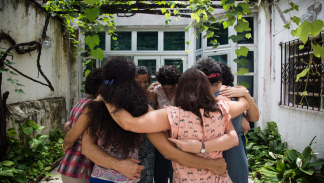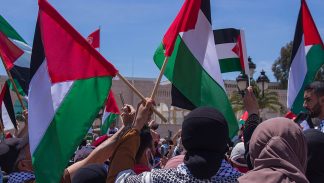Silence is complicity: A call for international solidarity with Syria
News Update: April 17
“If you were besieged under a sky of hell, what would you want the world to do?” – a woman in Ghouta, from the Syrian Female Journalists Network
On Saturday, April 7, the Syrian regime carried out an appalling attack on Douma in the Eastern Ghouta region containing chemical weapons—a clear and unacceptable violation of international law and human rights. The Violations Documentation Center (VDC) in Syria documented the April 7th bombings, including two airstrikes carrying poisonous gas with 45 casualties. The Syrian-American Medical Society said more than 500 people had been found with symptoms “indicative of exposure to a chemical agent,” according to the BBC, with symptoms including foaming at the mouth, abnormal pupils, and physical twitching. According to The Guardian, the Organization for the Prohibition of Chemical Weapons (OPCW) has recorded 390 allegations of the use of banned chemicals in Syria since 2014. As of Monday, April 16, UK officials report that Syria and Russia have denied OPCW chemical weapons inspectors access to sites in Douma to investigate the attacks.
In response to the barbaric attacks in Douma, one week later, the United States, the UK, and France began bombing government sites in Syria overnight on Friday, April 13—targeting weapons storage facilities. Although opposing Syria’s use of chemical weapons is undeniably important, these airstrikes are not only too little, too late, but seem to be driven by these western countries’ own national interests and agendas—including the U.S.’s relationship with Russia—rather than genuine value for Syrian lives or a coordinated, long-term strategy for peace and accountability in Syria.
“What matters in moving toward a meaningful solution for Syria is not a few strikes—and if strikes must happen, states need to give ample assurance that civilians are not harmed—but a long-term involvement to ensure that justice prevails, and that perpetrators of war crimes, whether from the Assad regime or extremist armed groups, are prosecuted for the crimes they have committed,” explains Zahra Vieneuve, Global Fund for Women’s Program Director for Freedom from Violence. “We must have a clear commitment from the international community to support efforts towards justice and peace led by the women human rights activists and leaders who did not give up for one moment despite the unbearable grief and loss, and the relentless violence. Western powers cannot decide to lead a series of strikes one day and then go back to weakly objecting and decrying violence in Syria the next day; the U.S., UK, France, and others have a moral responsibility to step up for the Syrian people.”
We join our partners and sisters in Syria and around the world in denouncing the abhorrent use of chemical weapons and ongoing bombing, and calling for accountability for those responsible for carrying out war crimes and repeatedly targeting civilians. There must be consequences for these atrocious actions, and the international community must do better than to allow this to continue. We echo the call from Women Now for Development, our grantee partner in Syria, to demand an immediate reinstatement of the ceasefire, immediate access for humanitarian aid and medical assistance, an immediate investigation of the chemical attacks by the OPCW, and that international monitors oversee negotiations which affect the fate of Syrian civilians.
Also, we echo the words of UN Secretary-General Antonio Guterres in his briefing to the Security Council on Saturday, April 14: “There is no military solution to the crisis. The solution must be political. We must find ways to make credible progress towards a genuine and credible political solution that meet the aspirations of the Syrian people to dignity and freedom in accordance with resolution 2254 and the Geneva Communiqué.”
As finding a political solution and providing international aid and political leadership continues to fail the Syrian people, we believe it is critically important to continue to invest in, support, and express solidarity with women’s groups in Syria. Grassroots women’s groups like Women Now for Development and the Syrian Female Journalists Network—Global Fund for Women grantee partners—are filling gaps to meet urgent needs by documenting the conflict, protecting women and families, sharing reliable information with the international community, and advocating for thoughtful, long-term, non-military intervention to bring justice and peace in Syria. They are supporting and empowering women and families, creating safe spaces for women to come together and learn skills, sharing women’s stories and experiences, and speaking up against atrocities. These women’s groups in Syria are a vital lifeline, working for peace and recovery, and building movements for meaningful and lasting change.
As we work with our partners to understand how best our international community can support women in Syria at this time, we know that solidarity is deeply needed. Silence is complicity.
Rula Asad, co-founder of the Syrian Female Journalists Network, explained that women in Syria don’t feel hopeful after all of the failure of the international community. “They feel that they’ve been left behind,” Rula shared, adding: “You have to use your privilege—you can go on the street and demonstrate. You can talk to your politicians. You need to show solidarity every day. It’s not ‘today I’m on and tomorrow I’m off’—you have to be ‘on’ all the time.”
Join us and share Women Now for Development’s online campaign #WomenOfGhouta to help amplify stories and women’s voices from on the ground in Ghouta, as well as the experiences of women who have been forcibly displaced. In this latest video, a woman speaks up about health care challenges including pregnancy, birth, and personal hygiene.
Samah’s story highlights her resilience and determination. Samah says, “All I want is to live to see my daughters grow up. I mustn’t surrender in the face of these conditions: not to the bombing, the hunger, the fears, or the repression.”

February 9, 2018
“We are used to life with the bombs, but in recent days it has turned into a frenzy.” – Mida, Idlib, Syria
Over the past week, violence has escalated in northern Syria as civilians pay the price. In an airstrike on Tuesday carried out by the Syrian regime and Russian allies in Eastern Ghouta that killed six civilians, the Women Now for Development center—which provides vital services to Syrian women and girls—was destroyed. The attack occurred at a time when the center was closed, so the Women Now team and the women they work with were unharmed.
“The people of Eastern Ghouta are facing some of the most dire moments since the start of the conflict,” explains Women Now for Development in their press release detailing the escalation of violence and calling for international attention and solidarity. A Global Fund for Women grantee partner, Women Now for Development is dedicated to deepening and strengthening women’s role in Syrian communities by enhancing their political, social, and cultural participation. The organization works to empower Syrian women both inside Syria and in its neighboring countries through leadership and vocational training, rights and political awareness workshops and lectures, as well as documenting testimonials and advocacy efforts.
According to Women Now, the situation for civilians is deteriorating as the siege tightens in the Damascus suburb of Eastern Ghouta and the countryside of Idlib. Fierce, intensifying airstrikes and bombing in both Eastern Ghouta and Idlib by the Syrian regime and its Russian allies, like that on Tuesday, has become all too common and intensified at a great cost to Syrian civilians.
“We are running from one place to the other but the planes are finding us,” explained Om Khaled, a Syrian woman activist and leader, speaking with us on Thursday from Idlib. Om Khaled added this is “one of the worst massacres in Idlib.”
Idlib is home to two million people—half of whom are internally displaced from other parts of Syria during the conflict. Women Now has detailed the deadly bombings in Idlib. “The bloodiest day in Idlib was 4 February, when the Syrian regime bombed the city of Saraqib with toxic gas, as well as hospitals in Ma’arat al-Nu’man and Kafr Nabel, killing 18 people,” explains Women Now in their press release. “Our Women Now centers in Ma’arat al-Nu’man were hit on 11 January and in Saraqib on 28 January. Many civilians were killed in these air raids and civilian structures destroyed. Because our centers are located in basement shelters, the damage was only material. However, the fear and panic our teams experienced in these moments was intense.”
Eastern Ghouta—a rebel stronghold—has been cut off for years from access to food and medicine by the government, leaving 400,000 residents, half of them children, malnourished. People are not allowed to leave even to seek medical treatment. Since the beginning of 2018, in just over one month, Eastern Ghouta has been the target of at least three suspected attacks using bombs containing chlorine—a weapon banned under international law—according to The New York Times in its coverage of Syria on the front page Friday morning, which describes the situations in Idlib and Eastern Ghouta at length.
“Many of our colleagues in Idlib and Eastern Ghouta have been displaced with their families, living in inadequate shelters while the terror around them engulfs all civilian life, despite the fact that none of these civilian shelters are in military zones,” explains Women Now in their press release.
While solidarity does not feel like enough in this escalating conflict, those of us who are not in Syria must show our sisters and brothers in Syria that they are not forgotten, that their humanity is recognized, and the losses of their loved ones are mourned by all of us. Join us in expressing solidarity, anger, and heartbreak with Syrians as they live in constant fear of this inhumane and escalating violence. We stand in support of our dear partners at Women Now for Development and the women and girls they work with, and send condolences to members who have lost loved ones in the carnage as well as those who have lost their homes.
“Join us by publicly and continuously expressing your anger towards the ongoing massacres of civilians in Syria. Share in our common humanity by coming up with different ways to garner the attention of your community to what is currently going on in Syria,” says Zahra Vieneuve, Global Fund for Women’s Program Director, Freedom from Violence. “Never stop. This is how we can build pressure against those governments that are silently looking the other way while Syrian, Russian, and now Turkish armies are bombarding civilians in Syria. The international community’s concern with what is happening in Syria should not be linked to whether we still see ISIS as a threat to the West or not.”
Join Women Now and us in calling for an immediate end to the targeting of civilians in Syria. Pressure your governments to amplify the calls for an immediate cease-fire issued by the United Nations on Tuesday, and demand that the Syrian government and all actors with a military presence in Syria stop attacks in residential areas and immediately put an end to human rights violations. We call on the Syrian government to end bombings of civilian areas, to open roads to and from besieged areas, to provide humanitarian assistance, and to assist the wounded in accordance with UN Security Council Resolution 2254.
“Without international intervention to stop the bombing and shelling and to break the sieges, Women Now warns that a humanitarian catastrophe is underway in Ghouta and Idlib. Women Now condemns the targeting of civilians and demands all parties and organizations concerned to take responsibility to stop these systematic violations of international law and protect civilians.”
Read Women Now for Development’s press release in full here. Image courtesy of Women Now: showing the destruction at Women Now for Development’s center in Eastern Ghouta following Tuesday’s airstrike.
Take action to support Women Now for Development in Syria through their emergency appeal here.
I mustn’t surrender in the face of these conditions: not to the bombing, the hunger, the fears, or the repression.Samah, #WomenofGhouta


